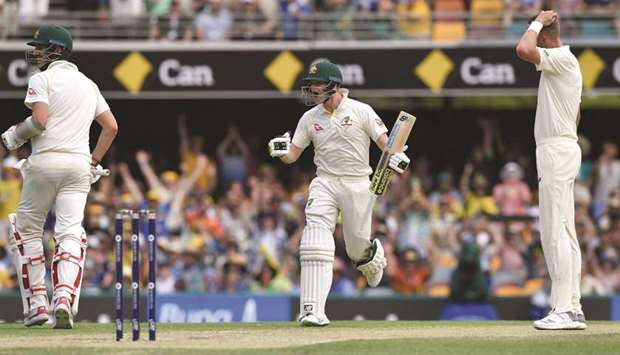When Steve Smith reached three figures at Pune in February he thumped his chest so hard it must have left a bruise. It was an innings he assessed as the best of his life. At the Gabba yesterday he repeated the act to mark his second masterpiece in the space of a year. In both cases, they were undeniably magnificent in their unfashionable ways.
Back then, the pitch was a disaster with runs gold dust in a country where Australia had been routinely embarrassed. Here, Smith’s first Ashes Test as captain, it is a match where only a victory is acceptable. “Everything,” he instinctively said when asked what it means to him. That had already been obvious to all in attendance.
Typically, when Smith has saluted for a century he has had team-mates doing the same. In Brisbane, after the top-order stumble on Friday and middle-order wobble before lunch yesterday, it was obvious that it would have to be him who climbed the mountain or his side would be trailing badly.
When reflecting on a century it is the shots that are supposed to dominate the praise commentary. But this was about the opportunities to score he denied himself across 561 minutes at the crease – that’s the better part of nine and a half hours’ thorough concentration.
After his Pune epic, Smith said that he had to “formulate some different plans” and “problem solve on the spot” to subsist. With his natural game to attack, the opposite was again required this time around as each partner fell and the degree of difficulty rose.
When England picked up Shaun Marsh early, Smith had no choice but to play on their terms, still 127 off finishing the first innings in the black. After the second new ball saw off Tim Paine and Mitchell Starc in the space of two overs, that point was reinforced.
Smith had made a lot of Australia’s habitual collapses in the lead up to the series, acknowledging that they had fallen over, by their internal metrics, 15 times in the previous 14 Tests. This was his chance to do something about it, joined by the perfect ally in Pat Cummins in his first outing on home soil.
England attacked Smith’s head and body with an earlier bouncer binge and after lunch were at it again. In both attempts, Joe Root loaded up the legside with catchers close to the bat and a ring 20 metres from the boundary. The message from one captain to the other was clear: have a go, mate.
But he wouldn’t, nor Cummins. The 66 the pair put on for the eighth wicket dragged the deficit to 27 and sucked the oxygen out of England’s surge. In the period immediately after lunch from Jake Ball and Chris Woakes, from 26 deliveries to Smith all but two pitched shorter than eight metres from him.
By the time Smith reached three figures – through his only stroke of note on the way, a sumptuous cover drive off Stuart Broad from the 261st ball he faced – it made for the slowest Australian century since Simon Katich in 2010.
But none of this mattered and the crowd knew it. Their response was as enthusiastic for an Australian ton as any since Steve Waugh’s final-ball finish in January 2003. They understood they were in the privileged position of witnessing a particularly special feat.
“I had to really dig deep,” Smith said. “It just meant a lot. Ashes series are always huge. As a captain I want to lead from the front as much as I can with my performance and how I bat. And all of it came out when I got to 100.”
That has been the consistent position of his since taking over the side – a belief his best contribution as skipper is through runs. That he is doing a pretty good job of that is highlighted by the extraordinary numbers he boasts in the role. Only Don Bradman has a higher average than the 72.46 he has posted as captain so far, netting a preposterous 13 centuries in 27 Tests while wearing the armband.
Overall, he has reached 21 Test centuries quicker than all but two others, his average now again in excess of 61. Not bad for a bloke who started out batting behind wicketkeeper Paine in his first Test when they debuted at Lord’s in 2010.
Most would be too mentally taxed to do it again in the second dig, but Smith isn’t most people. The way he responded after reaching his hundred, tapping the helmet repeatedly as though to re-set his computer, gives an insight into the relentless machine that it powers. Like Waugh before him, he’s never satisfied.
In Pune and Brisbane, the most naturally gifted batsman of his generation decided to instead become a little Aussie battler. For it, he has walked away with the best individual moments of his career. The question for Sunday: can Root do the same?

Australia’s batsman Steve Smith celebrates his century on third day of the first Ashes Test in Brisbane yesterday. (AFP)
